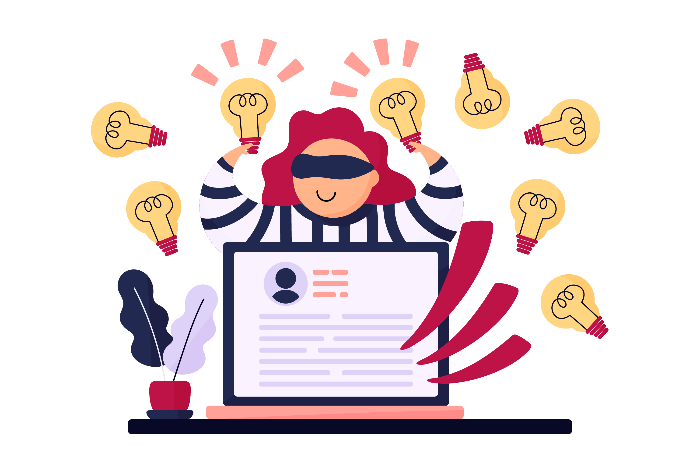The Growing Concern of Plagiarism in E-Learning
Imagine a scenario where a diligent student spends hours researching, crafting, and perfecting an essay for an online course. They submit their work with pride, only to later discover that parts of their hard-earned content have been copied and passed off as someone else’s. This scenario is not uncommon in the realm of e-learning, where plagiarism poses a significant challenge to academic integrity and the credibility of online education.
Plagiarism, the act of using someone else’s work without proper attribution, is a pervasive issue in e-learning platforms and digital content creation. With vast amounts of information readily available online, students may unknowingly or intentionally resort to copying content, undermining the learning process and devaluing the educational experience.
The impact of plagiarism in e-learning extends beyond individual assignments. It erodes the trust between educators and students, compromises the authenticity of academic achievements, and diminishes the reputation of educational institutions. Moreover, in a digital age where information can be easily replicated and distributed, combating plagiarism requires innovative solutions that go beyond traditional methods of detection and deterrence. This is where blockchain-based content verification emerges as a promising strategy to uphold academic integrity and combat plagiarism effectively.
Challenges faced by Educators and Institutions in detecting and preventing Plagiarism
Detecting and preventing plagiarism presents several challenges for educators and institutions in the e-learning landscape:
- Vast Amount of Digital Content: With a plethora of online resources available, identifying original sources and detecting copied content manually can be time-consuming and challenging.
- Diverse Forms of Plagiarism: Plagiarism comes in various forms, including direct copying, paraphrasing, and using unoriginal ideas. Each type requires different detection methods and strategies.
- Tech-Savvy Students: Many students are adept at using technology to mask plagiarism, such as using paraphrasing tools or purchasing pre-written essays from online sources, making it harder to detect copied content.
- Global Collaboration: E-learning often involves collaboration among students from different backgrounds and locations. Ensuring each student’s contribution is original and properly attributed can be complex, especially in group projects.
- Adapting to New Technologies: Plagiarism tactics evolve with advancements in technology. Educators and institutions must continuously update their plagiarism detection tools and methods to stay ahead of sophisticated plagiarism techniques.
- Privacy and Data Security: Implementing robust plagiarism detection systems while respecting student privacy and maintaining data security is a delicate balance that institutions must navigate.
- Educational Culture: Encouraging a culture of academic honesty and integrity among students requires ongoing education, communication, and reinforcement of ethical standards.
Addressing these challenges requires a multifaceted approach, combining technology solutions like plagiarism detection software with educational initiatives focused on promoting ethical writing practices and fostering a culture of integrity within e-learning environments.
Blockchain’s Role in Addressing Plagiarism Challenges
Blockchain technology, often associated with cryptocurrencies like Bitcoin, has emerged as a transformative innovation with far-reaching applications beyond finance. At its core, blockchain is a decentralized and immutable ledger that records transactions across a network of computers in a secure and transparent manner. Each transaction, or “block,” is linked to the previous one, creating a chain of blocks that cannot be altered retroactively without consensus from the network participants.
The potential of blockchain technology extends well beyond financial transactions. One promising application lies in addressing the persistent challenge of plagiarism through content verification. By leveraging blockchain, educators and institutions can establish a robust framework for verifying the authenticity and ownership of digital content in e-learning environments.
Blockchain’s key features, such as immutability, transparency, and decentralized consensus, contribute to its effectiveness in combating plagiarism:
- Immutability: Once data is recorded on a blockchain, it cannot be altered or tampered with. This ensures that content ownership and creation timestamps remain verifiable and tamper-proof, providing a reliable record of authenticity.
- Transparency: Blockchain operates on a transparent and distributed ledger accessible to all participants in the network. This transparency fosters trust and accountability by allowing stakeholders to verify the history and integrity of content ownership and usage.
- Decentralization: Unlike traditional centralized systems, blockchain is decentralized, meaning no single entity has control over the entire network. This decentralization reduces the risk of data manipulation and enhances the reliability of content verification processes.
- Smart Contracts: Blockchain platforms often support smart contracts, self-executing agreements with predefined conditions. Smart contracts can be utilized to automate content licensing, usage rights, and permissions, ensuring that content is used according to the creator’s specified terms.
By integrating blockchain-based content verification mechanisms into e-learning platforms, educators can more effectively detect instances of plagiarism, verify the originality of student submissions, and promote a culture of academic integrity. Furthermore, blockchain’s potential extends to credentialing and certification, providing secure and verifiable credentials for learners’ achievements in online education. This convergence of blockchain technology and e-learning holds promise for fostering a trustworthy and credible digital learning ecosystem.
Conclusion
Plagiarism remains a significant issue in e-learning, posing challenges for educators and institutions striving to maintain academic integrity in digital environments. Mindfire recognizes the pressing need for effective solutions to combat plagiarism and promote originality in online education. Leveraging blockchain technology, we can custom-build robust content verification systems that can not only detect plagiarism but also ensure transparency, immutability, and decentralized control over educational content.
As a leading blockchain development company, we invite businesses and educational institutions to partner with us. Together, we can revolutionize content verification processes, empower educators and learners with innovative tools, and foster a culture of ethical content creation and knowledge sharing in the digital learning landscape.
Contact us today to explore how our expertise can elevate your approach to content integrity and academic excellence in the evolving e-learning ecosystem.
